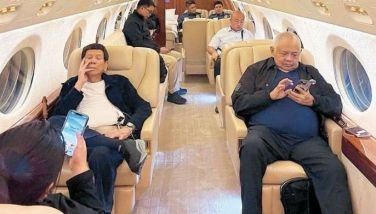SC orders IBC-13 to pay advertising firm P540 M in unused airtime spots
May 1, 2006 | 12:00am
The Supreme Court (SC) has ordered the management of the International Broadcasting Corp. (IBC) (Channel-13) to pay P540 million covering the value of 5,980 "unused" airtime spots of an advertising company.
In a 12-page decision penned by Associate Justice Consuelo Ynares-Santiago, the High Court’s first division affirmed a ruling of the Court of Appeals (CA) denying the petition of IBC-13 seeking to reverse the summary judgment of the Quezon City regional trial court (QCRTC), which ordered the television network to pay the Colours Network Inc. some P540 million for airtime spots the television station failed to accommodate.
The High Court did not give credence to IBC-13’s contention that the Quezon City court has no jurisdiction over the case because the Colours Network failed to pay the appropriate docket fees.
IBC-13 said that even if the Quezon City court has jurisdiction over the case, it should have, "in the interest of fair play, at least ordered the suspension of proceedings pending payment of the appropriate docket fees."
In its petition to dismiss the case before the Quezon City court, IBC-13 said Colours Network only paid P8,517 in docket fees, which should have been P5,452,237.
IBC-13 said the case should have been dismissed for lack of jurisdiction or suspended until the correct docket fees are paid.
On Aug. 20, 2004, the Quezon City court issued a summary judgment ordering IBC-13 to pay the Colours Network P540 million.
"In the case at bar, the respondent relied on the assessment made by the docket clerk, which turned out to be incorrect," the SC said. "The payment of the docket fees, as assessed, negates any imputation of bad faith or an intent to defraud the government by the respondent. Hence, the trial court properly acquired jurisdiction over the instant suit."
The SC ordered Quezon City RTC Branch 99 or its duly authorized deputy "to enforce the judgment lien and to assess and collect the additional fees from the respondent."
Court records showed that the Colours Network, through its officer Antonio Salvador, filed the lawsuit before the lower court in connection with their contracted airtime spots.
In its effort to put an end to the lawsuit, the IBC-13, through Boots Anson Roa, its president at the time, and Colours Network entered into a compromise agreement on May 22, 1998.
Under the compromise agreement, which was the subject of the dispute, "the balance of 5,980 primetime airtime spots shall mean usage in commercial placement for TV commercials. In the event of privatization, the said spots will be valued at the company’s prevailing market price and be made payable upon demand."
The case was dismissed on July 4, 1998.
On Dec. 18, 2000, the new management of IBC-13 led by Renato Bello filed a motion before the QCRTC seeking to nullify the compromise agreement after IBC-13 was privatized.
Bello’s group said the agreement entered into by the TV station’s former management was done without the requisite approval of the Presidential Commission on Good Government (PCGG).
On Jan. 5, 2001, the Colours Network filed a complaint for specific performance and damages against Roa’s group before the QCRTC Branch 99 for their refusal to comply with Paragraph 4 of the compromise agreement.
The two cases were later consolidated before the lower court and, on Sept. 23, 2003, Colours Network filed a motion for issuance of a writ of attachment.
In its motion for issuance of a writ of attachment, the Colours Network claimed that, with an average price of P90,000 per 30-second spot, the Colours Network claims already totaled P540 million.
In its ruling, the SC said that at the time of the filing of the Jan. 5, 2001 complaint by Colours Network, Paragraph 4 of the compromise agreement cannot be quantified in monetary terms yet.
The SC said the value of the prime time spots claimed by Colours Network was dependent upon the privatization of IBC-13 and its prevailing market price for these primetime spots.
"The only basis, then, for the computation of the docket fees are the damages that the respondent prays to be awarded to him," the High Court said. "It was only when the trial court rendered its summary judgment on Aug. 20, 2004 that respondent’s prayer for specific performance was valued at P540,000,000."
The SC said that the amount that IBC-13 claimed should be paid by Colours Network as docket fees constitutes a judgment lien on the P540 million awarded to the respondent by the trial court by way of summary judgment. — Jose Rodel Clapano
In a 12-page decision penned by Associate Justice Consuelo Ynares-Santiago, the High Court’s first division affirmed a ruling of the Court of Appeals (CA) denying the petition of IBC-13 seeking to reverse the summary judgment of the Quezon City regional trial court (QCRTC), which ordered the television network to pay the Colours Network Inc. some P540 million for airtime spots the television station failed to accommodate.
The High Court did not give credence to IBC-13’s contention that the Quezon City court has no jurisdiction over the case because the Colours Network failed to pay the appropriate docket fees.
IBC-13 said that even if the Quezon City court has jurisdiction over the case, it should have, "in the interest of fair play, at least ordered the suspension of proceedings pending payment of the appropriate docket fees."
In its petition to dismiss the case before the Quezon City court, IBC-13 said Colours Network only paid P8,517 in docket fees, which should have been P5,452,237.
IBC-13 said the case should have been dismissed for lack of jurisdiction or suspended until the correct docket fees are paid.
On Aug. 20, 2004, the Quezon City court issued a summary judgment ordering IBC-13 to pay the Colours Network P540 million.
"In the case at bar, the respondent relied on the assessment made by the docket clerk, which turned out to be incorrect," the SC said. "The payment of the docket fees, as assessed, negates any imputation of bad faith or an intent to defraud the government by the respondent. Hence, the trial court properly acquired jurisdiction over the instant suit."
The SC ordered Quezon City RTC Branch 99 or its duly authorized deputy "to enforce the judgment lien and to assess and collect the additional fees from the respondent."
Court records showed that the Colours Network, through its officer Antonio Salvador, filed the lawsuit before the lower court in connection with their contracted airtime spots.
In its effort to put an end to the lawsuit, the IBC-13, through Boots Anson Roa, its president at the time, and Colours Network entered into a compromise agreement on May 22, 1998.
Under the compromise agreement, which was the subject of the dispute, "the balance of 5,980 primetime airtime spots shall mean usage in commercial placement for TV commercials. In the event of privatization, the said spots will be valued at the company’s prevailing market price and be made payable upon demand."
The case was dismissed on July 4, 1998.
On Dec. 18, 2000, the new management of IBC-13 led by Renato Bello filed a motion before the QCRTC seeking to nullify the compromise agreement after IBC-13 was privatized.
Bello’s group said the agreement entered into by the TV station’s former management was done without the requisite approval of the Presidential Commission on Good Government (PCGG).
On Jan. 5, 2001, the Colours Network filed a complaint for specific performance and damages against Roa’s group before the QCRTC Branch 99 for their refusal to comply with Paragraph 4 of the compromise agreement.
The two cases were later consolidated before the lower court and, on Sept. 23, 2003, Colours Network filed a motion for issuance of a writ of attachment.
In its motion for issuance of a writ of attachment, the Colours Network claimed that, with an average price of P90,000 per 30-second spot, the Colours Network claims already totaled P540 million.
In its ruling, the SC said that at the time of the filing of the Jan. 5, 2001 complaint by Colours Network, Paragraph 4 of the compromise agreement cannot be quantified in monetary terms yet.
The SC said the value of the prime time spots claimed by Colours Network was dependent upon the privatization of IBC-13 and its prevailing market price for these primetime spots.
"The only basis, then, for the computation of the docket fees are the damages that the respondent prays to be awarded to him," the High Court said. "It was only when the trial court rendered its summary judgment on Aug. 20, 2004 that respondent’s prayer for specific performance was valued at P540,000,000."
The SC said that the amount that IBC-13 claimed should be paid by Colours Network as docket fees constitutes a judgment lien on the P540 million awarded to the respondent by the trial court by way of summary judgment. — Jose Rodel Clapano
BrandSpace Articles
<
>
- Latest
- Trending
Trending
Latest
Trending
Latest
Recommended




























